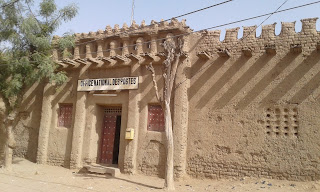The Best of All Possible Worlds?

Alice made a courtesy visit to the Prefect of Djenné, and I accompanied her. He was quite open about the present precarious situation. “The insecurity is creeping ever closer to Djenné”, he admitted. There was an attack on the Carrefour about a week ago. The scenario seems to be the same at every attack in the neighbouring villages: a handful of youths arrive on mopeds and start shooting at a guard post of Gendarmes from a distance. This time there were four attackers. The six gendarmes all fled, leaving their weapons for the attackers to pick up. Having helped themselves to the weapons they then burned whatever they could set light to and disappeared.
The targets are always Malian soldiers or anyone employed by the Malian state such as teachers. The schools in Tenekou and Mourha have closed a long time ago now. But the closer villages, such as Maman’s home village Tabato, and the town of Mounia at about 40 k from Djenné have both just closed their schools a couple of weeks ago. The teachers have been threatened: “ If you don’t leave we will come and kill you”. These are teachers who are not from the area, they have been placed there as civil servants and a far from their homes. It is no wonder if they leave if the Malian state cannot protect them by sending well trained soldiers and Gendarmes.
The attacks in Central Mali and in and around Djenné are not directed against foreigners at the moment at least. But they are very demoralizing for the population and the Malian state seems to do nothing about the fact that a large proportion of school children no longer have schools to go to.
And in Djenné itself the continued lack of tourists is taking a very heavy toll on the very fabric of the town- the mud buildings are crumbling for lack of maintenance. On my walk around town with Alice I noticed that even very important buildings like the historic ones next to the village chief’s are in a very bad state of repair. And I know that one of the Trois Foyers: the three houses of the Moroccan ruler in the heart of Djenné has partially collapsed. Babou Touré, its owner explained to me why it is more difficult to keep the houses in good repair now. “In the old days the neighbours all helped each other with the yearly ‘crepissage’ (mud plastering). The rice husks from the rice harvest were saved and for free. But now no one will work for free anymore, and the rice husks are no longer for free. Everyone has to have a smart phone and a moped and satellite TV, and that is all expensive so everyone wants money for even the smallest favour.”
Of course there is also the sense that mud is the past and cement is the future; and there is no revenue coming in through tourism to justify the continuation of mud building.
But there are also other forces involved it seems. One would almost say a wilful destruction of the mud façades. How could one otherwise explain that the town's newly aquired solar pannelled street lights are being installed with out any consideration whatsoever to aesthetics or even practicality? Here is one that has literally destroyed the mud façade of one of the Djenné houses!
“Since I am the only person in Djenné to ever pay my subscription, I think you should deliver my post to me!” I suggested, rather forcefully. “Yes”, he agreed meekly. “I will do that!”.










